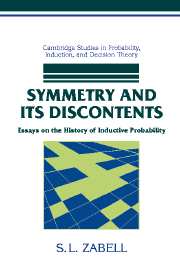2 - The Rule of Succession
Published online by Cambridge University Press: 05 June 2012
Summary
INTRODUCTION
Laplace's rule of succession states, in brief, that if an event has occurred m times in succession, then the probability that it will occur again is (m + 1)/ (m + 2). The rule of succession was the classical attempt to reduce certain forms of inductive inference – “pure inductions” (De Morgan) or “eductions” (W. E. Johnson) – to purely probabilistic terms. Subjected to varying forms of ridicule by Venn, Keynes, and many others, it often served as a touchstone for much broader issues about the nature and role of probability.
This paper will trace the evolution of the rule, from its original formulation at the hands of Bayes, Price, and Laplace, to its generalizations by the English philosopher W. E. Johnson, and its perfection at the hands of Bruno de Finetti. By following the debate over the rule, the criticisms of it that were raised and the defenses of it that were mounted, it is hoped that some insight will be gained into the achievements and limitations of the probabilistic attempt to explain induction. Our aim is thus not purely – or even primarily – historical in nature.
As usually formulated, however, the rule of succession involves some element of the infinite in its statement or derivation. That element is not only unnecessary, it can obscure and mislead. We begin therefore by discussing the finite version of the rule, its statement, history, and derivation (sections 2–3), and then use it as a background against which to study the probabilistic analysis of induction from Bayes to de Finetti (sections 4–9).
Information
- Type
- Chapter
- Information
- Symmetry and its DiscontentsEssays on the History of Inductive Probability, pp. 38 - 73Publisher: Cambridge University PressPrint publication year: 2005
